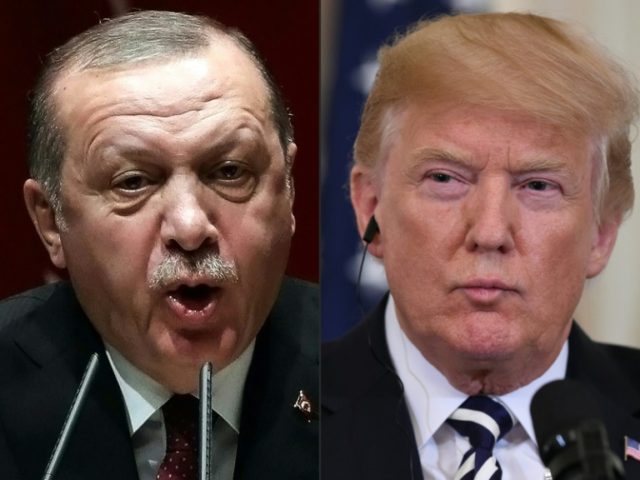The government of Turkey confirmed Tuesday that President Recep Tayyip Erdogan will meet with President Donald Trump in Japan this weekend as both attend the annual G-20 summit in Osaka. High on the list of discussion topics is Erdogan’s insistence of buying Russian surface-to-air missiles that violate NATO protocol.
Erdogan enters the talks politically weakened at home by a decisive secularist victory against his hand-picked candidate for mayor of Istanbul, Binali Yildirim. Mayor-elect Ekrem Imamoglu defeated Yildirim a second time on Sunday after Erdogan called for a re-do of the election citing unspecified “organized crime” fraud. Turkey also has some unfinished business with U.S. consulate employees arrested on charges of following Islamic cleric Fethullah Gülen, who Ankara insists is a terrorist.
The meeting will be the first between the two leaders in almost a year. Trump and Erdogan met at a NATO summit in Brussels, where Trump reportedly praised Erdogan for meeting NATO’s spending commitments, unlike most of the alliance’s members.
Turkey’s state-run Anadolu Agency reported that the meeting will happen sometime between June 28-29, during the summit, but did not specify when or the nature of their meeting – if it will occur on the sidelines of the conference or as its own separate event.
Anadolu cited the White House as its source for the meeting without adding any new information from Ankara. It noted that Erdogan is on a long list of heads of government that Trump is scheduled to meet with at the summit, including Chinese communist leader Xi Jinping, Crown Prince of Saudi Arabia Mohammed bin Salman and Russian President Vladimir Putin.
The Turkish government news agency did place high priority on Trump and Erdogan’s disagreement on the latter’s purchase of Russian S-400 missiles, which are not interoperable with NATO weapons and are thus a violation of the military alliance’s regulations. Turkey cannot fire the missiles from F-35 fighter jets, the standard NATO vehicles, a fact that American officials have argued means the Russian weapons present a threat to all members of the alliance. Having Russian military staff at the same airbase and military facilities as Americans working on F-35s presents a direct national security threat to the United States, American officials have contended.
Instead of the S-400s, Washington has proposed selling Turkey its Patriot missiles, which function as part of all NATO systems. Erdogan has promised that he does not intend for the military to mix the S-400 system with American-manufactured military hardware.
Erdogan announced on Tuesday that Turkey will receive the first shipment of S-400 missile materials in July.
“The issue of S-400 is an issue directly related to our sovereignty and we will not backtrack from that. God willing, the delivery of the S-400 will start next month,” Erdogan insisted. “We will not take a step back from this.”
Last month, Erdogan also proposed Turkey’s involvement in the development of the S-500, the next generation of Russian missiles. This followed an in-person meeting with Putin after the United States paused shipments of support technology for the F-35.
“In order to meet its security needs, Turkey … does not need to get permission, let alone bow to pressure,” Erdogan said this week.
American officials have threatened sanctions on Turkey over the purchase, a threat Ankara dismissed despite the crippling effects to its economy the last round of American sanctions – a response to Erdogan’s government taking American Pastor Andrew Brunson hostage – had. Erdogan himself predicted last week that he did not believe the United States would enact sanctions over the Russian missile purchase.
“Regardless of whatever sanctions there may be, whatever the messages from America, we’ve bought the S-400,” Foreign Minister Mevlut Cavusoglu said on Monday. “If there’s an attack on Turkey tomorrow, we cannot expect NATO to protect us because NATO’s capacity would only protect 30 percent of Turkey’s airspace.”
Some members of Erdogan’s Islamist Justice and Development Party (AKP) have gone even further. Lawmaker Samil Tayyar referred to the alliance as a “terror organization” in 2017, long before Erdogan flirted with the idea of buying Russian missiles, as part of a larger accusation against NATO for allegedly having a history of supporting coups.
“Turkey has been subjected to coups since it joined NATO. NATO has always been in charge of the dirty and bloody deeds in the country. The 1960 military coup was staged by the British, the 1971 coup was staged by the CIA, and the 1980 coup was staged by NATO. In NATO’s new plan, a Turkey with Erdogan should not exist,” Tayyar said at the time.
Turkey’s economy could grow or shrink significantly on the back of the results of Erdogan’s meeting with Trump. As Reuters reports, investors are wary that the S-400 purchase could trigger sanctions that would make Turkey’s volatile economy even more dangerous to pour money into. The Turkish lira has been on a steady decline in value this year that could, however, be offset by Trump and Erdogan reaching new trade agreements.

COMMENTS
Please let us know if you're having issues with commenting.